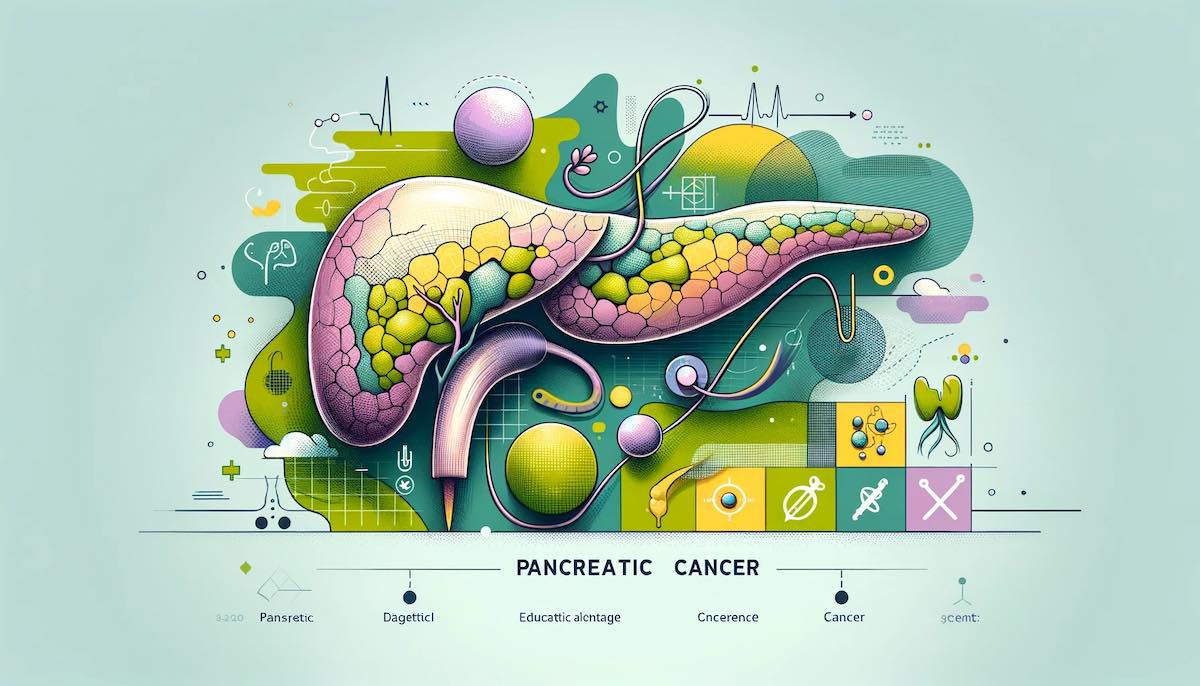Pancreatic Cancer: Understanding the Challenge

It is one of the most challenging cancers to diagnose and treat. This article provides a comprehensive overview of pancreatic cancer, including its symptoms, risk factors, diagnostic methods, and treatment options, aimed at increasing awareness and understanding of this serious condition.
What is Pancreatic Cancer?
It begins in the tissues of the pancreas, an organ in the abdomen that lies behind the lower part of the stomach. The pancreas plays an essential role in digestion and in regulating blood sugar. It is known for its aggressive nature and tendency to spread rapidly.
Symptoms of Pancreatic Cancer
They are often vague and can include:
- Jaundice (yellowing of the skin and eyes)
- Pain in the upper abdomen or back
- Unintended weight loss
- Loss of appetite
- Fatigue
- New-onset diabetes
Diagnosing Pancreatic Cancer
Diagnosis of pancreatic cancer can be challenging as symptoms often appear in later stages. Methods include:
- Imaging tests like CT scans, MRI, and PET scans
- Endoscopic ultrasound (EUS)
- Biopsy for a definitive diagnosis
Treatment Options
Treatment depends on the stage and location of the cancer and may include:
- Surgery: For early-stage pancreatic cancer, surgery may involve removing part of the pancreas or other nearby tissues.
- Chemotherapy: Often used before or after surgery, or as the main treatment when surgery isn’t an option.
- Radiation Therapy: Sometimes used in conjunction with chemotherapy.
- Targeted Therapy and Immunotherapy: For advanced cases, these newer types of treatments can be options.
RELATED POSTS
The Importance of Early Detection
Early detection significantly improves the effectiveness of treatment. Awareness of risk factors and symptoms is crucial for early diagnosis.
Global Access to Pancreatic Cancer Treatment
In recent years, the ability to access top-quality medical treatment for pancreatic cancer has become significantly easier, transcending geographical boundaries. Advances in global healthcare infrastructure and the rise of medical tourism enable patients to seek care from world-renowned oncologists and state-of-the-art medical facilities, regardless of their location. This global accessibility is particularly beneficial for conditions like pancreatic cancer, where specialized expertise and advanced treatment options can greatly influence patient outcomes. Patients now have the opportunity to explore the best possible treatments, including the latest in surgical techniques, chemotherapy protocols, and emerging therapies like targeted treatment and immunotherapy, available across the globe. Additionally, advancements in telemedicine and digital communication have made consultations and follow-up care with leading cancer specialists more accessible, ensuring that patients receive the most comprehensive and effective treatment available.
The Vital Role of Expert Medical Care in Pancreatic Cancer
The expertise of healthcare professionals is crucial in the successful diagnosis and treatment of pancreatic cancer. Given the complexity and aggressive nature of the disease, specialized knowledge and experience are paramount. Expert oncologists are skilled in using advanced diagnostic tools to detect the disease, often in its early stages when treatment is more effective. Their deep understanding of the cancer’s behavior guides the development of personalized treatment plans that may include a combination of surgery, chemotherapy, radiation therapy, and newer modalities like targeted therapies and immunotherapy. Furthermore, experienced doctors are better equipped to manage the multifaceted challenges of pancreatic cancer, including addressing the side effects of treatment and providing comprehensive care. Access to specialized care, therefore, not only increases the likelihood of a successful outcome but also ensures a holistic approach to patient well-being throughout the treatment journey.
Get a Medical Opinion
Fill out the form and we will contact you shortly.
Frequently Asked Questions About Pancreatic Cancer
Early signs can be vague but may include jaundice, upper abdominal or back pain, unintended weight loss, loss of appetite, and new-onset diabetes.
Yes, especially when diagnosed early. Treatment options include surgery, chemotherapy, radiation therapy, and in some cases, targeted therapies and immunotherapy.
Diagnosis often involves imaging tests like CT scans, MRI, and endoscopic ultrasounds, along with biopsies to confirm the presence of cancer cells.
Risk factors include smoking, chronic pancreatitis, obesity, a family history and certain genetic syndromes.
Recent advancements include developments in minimally invasive surgical techniques, targeted therapy, immunotherapy, and more personalized approaches based on the genetic makeup of the tumor.
Conclusion
Pancreatic cancer presents significant challenges, but understanding the disease is the first step in combating it. Advances in medical research and treatment are offering new hope to those affected by this condition.
RELATED POSTS
Contact Information
- WhatsApp: +90 541 469 11 94
- Email: [email protected]
We connect you with top medical specialists and provide comprehensive support to optimize your healthcare decisions. Empowering you to make informed choices for a healthier future
Get a Medical Opinion
Fill out the form and we will contact you shortly.

